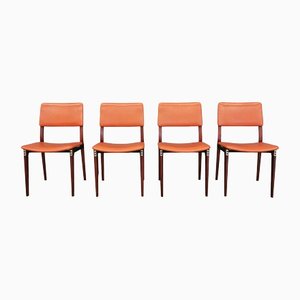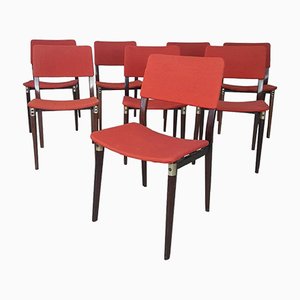
Eugenio Gerli (b. 1923) is an Italian architect and industrial designer known for his long-lasting collaboration with the Italian architect-designer Osvaldo Borsani and the Italian manufacturer Tecno.
In 1949, Gerli graduated with a degree in engineering and began his career a year later, opening his own architectural and industrial design practice. Gerli began experimenting with various materials such as resin, felt, and molded plywood, which led to designs he presented in 1951 at the 9th Triennale di Milano; his bent plywood armchair for Forma (1950s); and the three-legged Sommaruga Chair (1950s), which was made from resin reinforced molded felt on a steel base. Architecturally, the firm focused on residential and public buildings, as well as the renovation of historic Italian buildings. Notable architectural projects include the Cardiology Clinic in Laveno-Monbello (1950), the Ambasciatori Theater in Milan (1954), the renovation and restoration of the Castiglioni Palace (1903). Gerli was later joined by his two sons, Enrico and Guido, in the 1970s.
In 1957 Gerli began a long and fruitful collaboration with the Borsani brothers, Fulgenzio and Osvaldo Borsani (1911-1985)—founders of the Italian furniture manufacturing company Tecno. In 1968, Gerli and Osvaldo Borsani exhibited their revolutionary Graphis Office System (1967) at the 14th Triennale di Milano. The system, which was made up of just three basic elements, was heralded as a revolution in office furniture design because the system’s modular components allowed unlimited and customizable combinations, which could grow (or contract) with the company. The system remained a bestseller for decades and Tecno became synonymous for technologically-advanced design. The partnership between Gerli and Tecno lasted for more than 35 years, and resulted in many 20th-century design classics such as the T92 Butterfly Table (1960 with Mario Cristiani); T69 Table (1963 with Borsani), which features a cast dovetailing central base; the stackable S83 Chair (1966), and the PS142 and S142 armchairs (both 1966), among others.
During the 1970s, Tecno launched its Centro Progetti Tecno (CPT), an in-house team dedicated to communications and industrial design work. The team, which included Gerli, Valeria Borsani, Kugo Toru, Borsani and his son Marco, became a driving force of technologically advanced ideas in design. Although Borsani remained in charge, the purpose of the department was to present future designs as group creations. The CPT was responsible for a number of the company’s successes, including the molded plastic Modus Office Chair (1972), which won the SMAU Prize in 1973; the steel mesh Waiting System (1983), a modular seating and table concept for large public spaces; and the rebranding of Alitalia worldwide (1982-84), for which Centro Progetti Tecno was awarded the Compasso d’Oro in 1984.
Although Gerli's career as an architect-designer was prolific, his work is often overshadowed by his contemporaries and the legacy of his long-term partner, Osvaldo Borsani.


